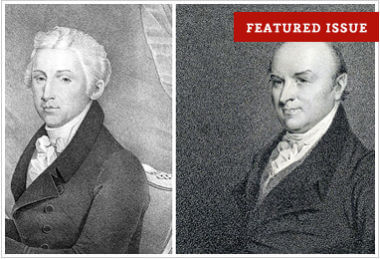Featured in Issues & Controversies in American History:
The U.S. Closes the Western Hemisphere to European Influence
 In the early 1820s, U.S. leaders feared that Spain might try to reclaim its former colonies in the Western Hemisphere that had recently gained their independence. Great Britain offered to make an alliance with the United States to protect these new countries. When President James Monroe discussed this matter with his Cabinet secretaries in November 1823, most urged him to accept Britain’s offer, arguing it would safeguard the new countries’ independence and elevate America’s stature. But one Cabinet member, Secretary of State John Quincy Adams, disagreed, arguing that the United States should not accept Britain’s offer and should warn all European powers to keep out of the Western Hemisphere. In December 1823, President Monroe announced his decision, setting forth a foreign policy that would become known as the Monroe Doctrine.
In the early 1820s, U.S. leaders feared that Spain might try to reclaim its former colonies in the Western Hemisphere that had recently gained their independence. Great Britain offered to make an alliance with the United States to protect these new countries. When President James Monroe discussed this matter with his Cabinet secretaries in November 1823, most urged him to accept Britain’s offer, arguing it would safeguard the new countries’ independence and elevate America’s stature. But one Cabinet member, Secretary of State John Quincy Adams, disagreed, arguing that the United States should not accept Britain’s offer and should warn all European powers to keep out of the Western Hemisphere. In December 1823, President Monroe announced his decision, setting forth a foreign policy that would become known as the Monroe Doctrine.
Let your students get the facts and decide for themselves: Was the Monroe Doctrine motivated by democratic ideals or national self-interest? Should the United States have adopted the Monroe Doctrine, or should it have entered into a joint British-American alliance instead? Be sure to check out Issues & Controversies in American History’s clear and unbiased examination of the Monroe Doctrine this month.
Click on the links below for more information about Issues & Controversies in American History:

